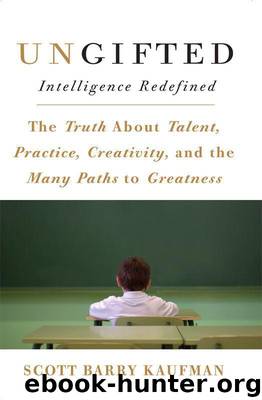Ungifted: Intelligence Redefined by Kaufman Scott Barry

Author:Kaufman, Scott Barry [Kaufman, Scott Barry]
Language: eng
Format: epub
Publisher: Basic Books
Published: 2013-06-03T20:00:00+00:00
Some of the beekeepers are clever.
Are all artists clever?
One participant remarked, “I thought of all the little … artists in the room and imagined they all had beekeeper’s hats on.”91 You may have relied on an altogether different mental model. How you represented the problem, however, strongly determined how well you were able to reason with the information. If you started with an inaccurate representation, you were more likely to overburden your working memory and end up with an inaccurate answer, regardless of the level of syllogistic reasoning you are actually capable of attaining.
People can be taught to improve their reasoning by learning how to draw diagrams to represent a problem.92 Even blind people can create spatial mental models.93 When Kenneth Gilhooly and his colleagues presented syllogisms orally, it placed a higher demand on working memory, as participants had to store the premises in their head.94 But when the syllogisms were presented with all the premises remaining on the projector screen, people performed better because they could unload the premises from their working memory and free up limited resources to construct efficient mental models.
Over the past decade John Sweller and colleagues have designed instructional techniques that relieve working memory burdens on students and increase learning and interest.95 Drawing on both the expertise and working memory literatures, they match the complexity of learning situations to the learner, attempting to reduce unnecessary working memory loads that may interfere with reasoning and learning, and optimize cognitive processes most relevant to learning.
Finally, it’s important to consider length of training. In a recent New York Times Op-Ed called “IQ Points for Sale, Cheap,” David Z. Hambrick notes his skepticism that a few hours of working memory training can create long-lasting and meaningful improvements in IQ.96 He makes an important point that such increases aren’t likely without substantial commitment of resources. Hambrick points to a few kindergarten after-school programs that involve substantial enrichment and support but don’t demonstrate a large increase in IQ scores, and whatever increases are found don’t sustain in the long-term.97
If the skills that determine someone’s IQ test score operate by the same developmental principles as any other abilities, then why would we expect them to be radically improved through enrichment programs that may last no more than sixty hours, let alone working memory training that lasts only a few hours? As Michael Howe notes in his book IQ in Question, “If we start by assuming that the skills that contribute to a person’s IQ score have no special or unlearned status, and are acquired by processes that are similar to the ones involved in the acquisition of other kinds of mental expertise, then it makes sense to ask how much time is typically needed in order to gain those mental abilities that are acknowledged to be acquired through learning.”98
Howe suggests that the amount of training would be at least as large as the time necessary to acquire high levels of expertise in music, chess, and sports. After all, IQ tests sample an assortment of mental forms expertise.
Download
This site does not store any files on its server. We only index and link to content provided by other sites. Please contact the content providers to delete copyright contents if any and email us, we'll remove relevant links or contents immediately.
| Administration & Medicine Economics | Allied Health Professions |
| Basic Sciences | Dentistry |
| History | Medical Informatics |
| Medicine | Nursing |
| Pharmacology | Psychology |
| Research | Veterinary Medicine |
The Art of Thinking Clearly by Rolf Dobelli(10489)
The 5 Love Languages: The Secret to Love That Lasts by Gary Chapman(9815)
Mindhunter: Inside the FBI's Elite Serial Crime Unit by John E. Douglas & Mark Olshaker(9343)
Becoming Supernatural by Dr. Joe Dispenza(8217)
Nudge - Improving Decisions about Health, Wealth, and Happiness by Thaler Sunstein(7707)
The Road Less Traveled by M. Scott Peck(7603)
Mastermind: How to Think Like Sherlock Holmes by Maria Konnikova(7347)
Enlightenment Now: The Case for Reason, Science, Humanism, and Progress by Steven Pinker(7314)
Win Bigly by Scott Adams(7199)
The Way of Zen by Alan W. Watts(6614)
Factfulness: Ten Reasons We're Wrong About the World – and Why Things Are Better Than You Think by Hans Rosling(4742)
The State of Affairs by Esther Perel(4721)
Gerald's Game by Stephen King(4654)
Man's Search for Meaning by Viktor Frankl(4606)
The Confidence Code by Katty Kay(4260)
Thinking in Bets by Annie Duke(4227)
The Healing Self by Deepak Chopra(3580)
Hidden Persuasion: 33 psychological influence techniques in advertising by Marc Andrews & Matthijs van Leeuwen & Rick van Baaren(3565)
The Worm at the Core by Sheldon Solomon(3487)
